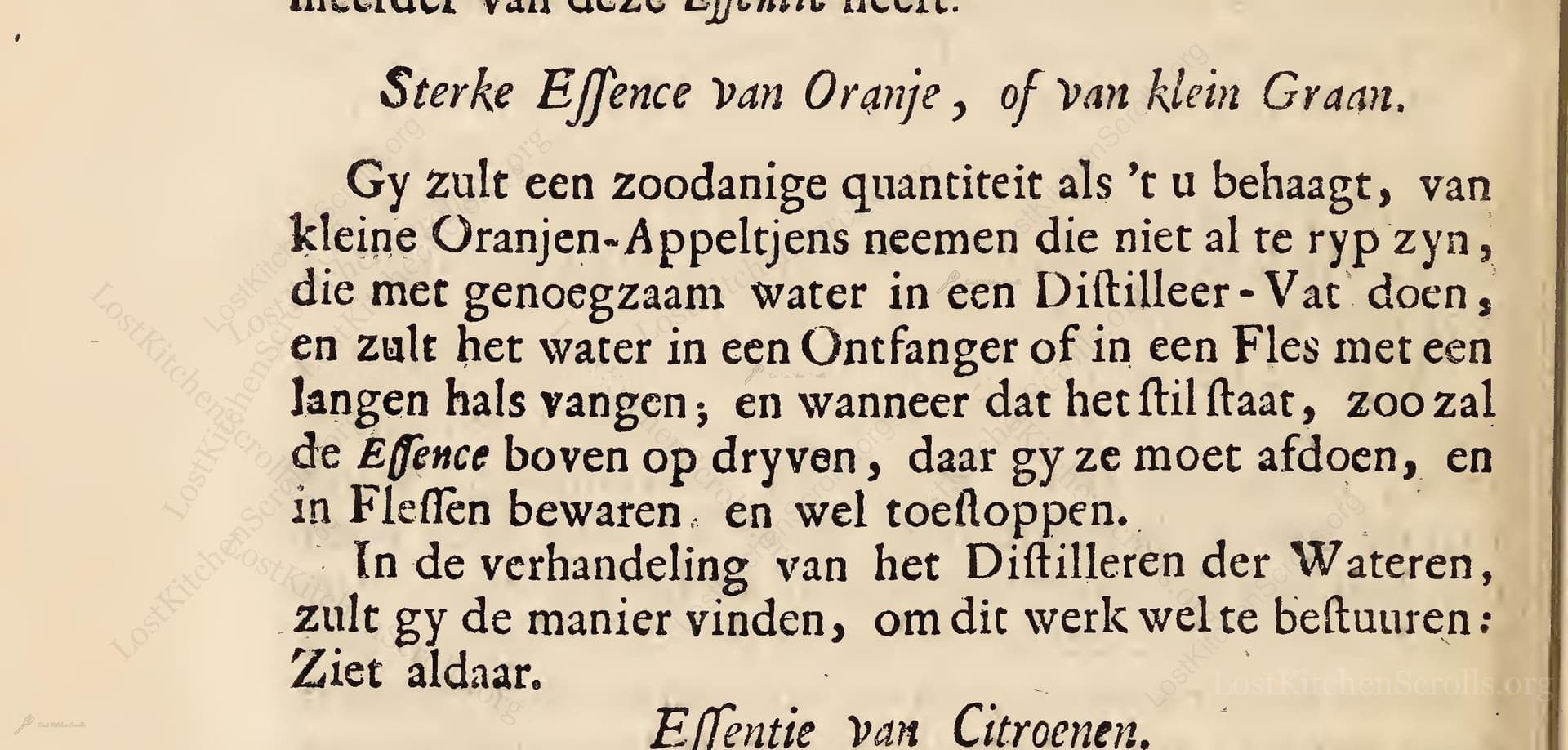Sterke Effence Van Oranje, Of Van Klein Graan
"Strong Essence Of Orange, Or Of Small Grain"
From the treasured pages of Het Hollands, of Neederlands kook-boek
Unknown Author

Sterke Effence Van Oranje, Of Van Klein Graan
"Gy zult een zoodanige quantiteit als 't u behaagt, van kleine Oranjen-Appeltjens neemen die niet al te ryp zyn, die met genoegzaam water in een Distilleer-Vat doen, en zult het water in een Ontfanger of in een Fles met een langen hals vangen; en wanneer dat het stil staat, zoo zal de Essense boven op dryven, daar gy ze moet afdoen, en in Flessen bewaren en wel toefloppen. In de verhandeling van het Distilleren der Wateren, zult gy de manier vinden, om dit werk wel te bestuuren: Ziet aldaar."
English Translation
"You shall take such a quantity as you wish of small oranges that are not too ripe, put them with sufficient water in a distilling vessel, and collect the water in a receiver or in a bottle with a long neck; and when it settles, the essence will float on top, which you should remove and store in bottles, sealing them well. In the treatise on the distillation of waters, you will find the method to conduct this work properly: see there."
Note on the Original Text
The recipe is written in an older form of Dutch, where spellings and word choices may differ from modern usage. For instance, 'Ontfanger' is the receiver flask, and 'toefloppen' means to close tightly. Like many recipes of its era, instructions are flexible—quantities are left to the cook's judgment, reflecting reliance on experience rather than explicit measurement. Reference is made to a separate text covering distillation techniques, assuming the reader’s familiarity with this advanced kitchen process.

Title
Het Hollands, of Neederlands kook-boek (1725)
You can also click the book image above to peruse the original tome
Writer
Unknown
Era
1725
Publisher
J. du Vivie
Background
A delectable journey into 18th-century Dutch cuisine, this cookbook serves up traditional recipes, culinary wisdom, and a flavorful glimpse of the Netherlands’ rich gastronomic heritage.
Kindly made available by
Internet Archive
This recipe comes from an early eighteenth-century Dutch recipe collection and gives us a peek at the world of historic distillation. In 1725, distilling aromatic waters and essences was a widely practiced kitchen art in the Netherlands. Such essences of orange were highly valued for both medicinal and culinary uses—flavoring baked goods, sweetmeats, and even adding fragrance to rooms and linens. The recipe speaks to a time when home kitchens doubled as small laboratories, with practitioners comfortable with fairly sophisticated techniques.

Back in the early 1700s, a home cook would use a copper or earthenware still (distilleer-vat), a receiver flask with a long neck, and perhaps a cloth for skimming off the essential oil. Glass bottles with tight stoppers were used for storage. Temperature was controlled with a careful fire or stove—no thermostats or electric burners here! Today, a small countertop still, a glass separation funnel, and sterilized glass bottles will do the trick, though laboratory glassware is a safer, more reliable modern substitute.
Prep Time
10 mins
Cook Time
3 hrs
Servings
1
We've done our best to adapt this historical recipe for modern kitchens, but some details may still need refinement. We warmly welcome feedback from fellow cooks and culinary historians — your insights support the entire community!
Ingredients
- 2–4 lbs small, underripe bitter oranges (substitute: Seville oranges or other tart, aromatic oranges)
- Sufficient water to cover the fruit (approx. 3–4 quarts)
- No other ingredients required
Instructions
- To prepare a strong essence of orange or small grain, select as many small, underripe bitter oranges (or Seville oranges, if available) as you wish.
- Rinse the oranges and place them whole in a large pot or, ideally, a modern still with enough water to cover them.
- Slowly distill the mixture, collecting the distillate in a glass container with a long neck, such as a separation funnel or a laboratory flask.
- Allow the collected liquid to settle so that the essential oil (essence) rises to the surface.
- Skim off the oil and store it in clean, tightly-sealed glass bottles.
- Use care when distilling—maintain a gentle, steady heat so the oranges do not scald.
- Consult resources on distillation if you are unfamiliar with the process, as temperature control is crucial for good yields and safety.
Cooking Estimates
You will need about 10 minutes to rinse the oranges and set up your equipment. The distillation process itself takes several hours as you need to heat the mixture slowly and carefully.
As noted above, we have made our best effort to translate and adapt this historical recipe for modern kitchens, taking into account ingredients nowadays, cooking techniques, measurements, and so on. However, historical recipes often contain assumptions that require interpretation.
We'd love for anyone to help improve these adaptations. Community contributions are highly welcome. If you have suggestions, corrections, or cooking tips based on your experience with this recipe, please share them below.
Join the Discussion
Rate This Recipe
Dietary Preference
Main Ingredients
Culinary Technique
Occasions

Den Bockfisch In Einer Fleisch Suppen Zu Kochen
This recipe hails from a German manuscript cookbook compiled in 1696, a time whe...

Die Grieß Nudlen Zumachen
This recipe comes from a rather mysterious manuscript cookbook, penned anonymous...

Ein Boudain
This recipe comes from an anonymous German-language manuscript cookbook from 169...

Ein Gesaltzen Citroni
This recipe, dating from 1696, comes from an extensive anonymous German cookbook...
Browse our complete collection of time-honored recipes



